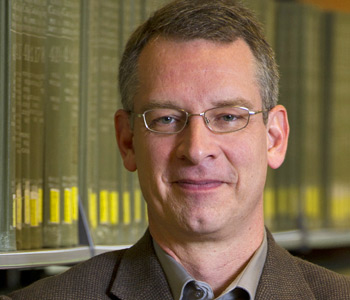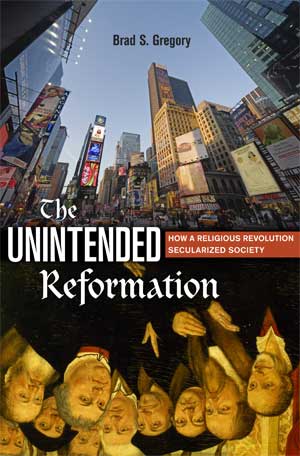
The Unintended Reformation is a wide-ranging revisionist history that concerns the present as much as the past. It argues that in central respects, North American and European life in the early twenty-first century is the complex, long-term, unintended result of the Reformation era’s unresolved doctrinal disagreements and destructive religio-political conflicts.
Latin Christianity around 1500 was not “religion” understood as something separate and separable from the rest of human life. It was rather an institutionalized worldview that sought to inform all its dimensions. Rejections of the Roman church in the Protestant Reformation therefore had widely ramifying effects.
The book analyzes six domains in which the Reformation’s impact was especially consequential: the relationship among science, religion, and metaphysics; the basis for truth claims about “Life Questions” related to human values and meaning; the institutional locus of political power; moral discourse and moral practices; human desires and capitalism; and higher education and assumptions about knowledge. One chapter in the book is devoted to each of these areas, tracing their respective transformations between the sixteenth century and the present.
Magisterial and radical Protestant reformers addressed long acknowledged problems of the late medieval church by turning to God’s word alone, in the Bible. Collectively, this produced incompatible truth claims about scripture’s meaning and applications. The resulting disagreements about answers to Life Questions have been with us since the 1520s. Efforts were made in early modern Europe to contain and control their socially divisive, sometimes politically subversive effects. Most influentially through modern philosophy, the content of rival answers to Life Questions has been augmented and complicated in countless ways. Yet the history of modern philosophy since Descartes shows that secular answers based on reason have been and remain no less contested than Protestant answers based on scripture.
The latter-day outcome of Reformation-era disagreements is manifest today in a hyperpluralism of religious and secular truth claims. Sovereign states are the hegemonic institutions that permit individuals to believe whatever they wish so long as they are politically obedient. Pervasive consumerist capitalism provides the main cultural counterweight to ideological heterogeneity.
The Unintended Reformation is structured as six genealogical (but not teleological) narratives. Each begins in the late Middle Ages and runs to the present, emphasizing the transformative effects of the Reformation era. The book transgresses conventional schemes of historical periodization. It rejects any attempt to “cover everything” as incompatible with its objective to reconstruct an explanatorily powerful long-term narrative.
I also reject the scholarly division of labor whereby historians of the modern era shoulder full responsibility for explaining the formation of the contemporary world. The Unintended Reformation argues that historical realities from five and six centuries ago are still influencing the present in profound yet largely unacknowledged ways.
Methodologically, the book endeavors to show that fresh insight into historical change is possible by disentangling domains of human life that were lived in intertwined ways. The chapters’ respective subjects are distinguished for analytical purposes in pursuit of explanatory insight.
The entire book must be read if it is to be understood. Readers who concentrate on individual chapters at the expense of the whole will miss the book’s overarching argument.
Although I make no claims to comprehensiveness, The Unintended Reformation is an ambitious book: It seeks to explain the historical formation of some of the dominant beliefs, assumptions, practices, and institutions of the contemporary Western world.
I assume that the most consequential historical realities in this formation have the most explanatory power for historians. This principle underlies the choice of the six domains of human life mentioned above. Even though Western Christianity since the late Middle Ages is at the heart of the book, modern science, capitalism and consumerism, sovereign states, and individual autonomy are critically important in The Unintended Reformation. No credible account of the making of the contemporary Western world could leave them out.
The emergence of each of these historical realities entailed their disembedding from Christianity. The unintended foundations for this process were the doctrinal disagreements and religio-political conflicts of the Reformation era, from the 1520s through the 1640s.
Doctrinal controversy paralyzed explicitly Christian claims about divine revelation and God’s relationship to the natural world, leaving only empirical investigation and supra-confessional reason as the means for its investigation, whether in modern science or philosophy. The causal explanation of natural regularities in the sciences turned out not to require any recourse to God or theology.
Avarice reinvented as benign self-interest provided ideological support for the self-colonization of early modern Christians by capitalism in what Jan de Vries has called the industrious revolution. Individual acquisitiveness in pursuit of pleasure and enjoyment provided an ideology about which antagonistic Christians could agree, pioneered especially in the Golden Age Dutch Republic.
By the late sixteenth century, sovereign rulers and territorial princes controlled churches no less in Catholic than in Protestant regions. Only those forms of Protestantism with political support could have a sustained social and cultural influence, namely Lutheranism and Reformed Protestantism, including the Church of England.
Because individuals disagreed about the meaning of God’s truth, the freedom to believe and worship—or not—would have to be protected at the individual level, by sovereign states which in effect thereby functioned as incubators of modern individualism. Freedom of religion, by separating the rest of life from religion, proved to be critical to the secularization of society and religion.
In many respects, The Unintended Reformation seeks to elaborate on a claim made at the end of my first book, Salvation at Stake: Christian Martyrdom in Early Modern Europe: “incompatible, deeply held, concretely expressed religious convictions paved a path to a secular society.”
The Unintended Reformation combines two of my long-standing scholarly preoccupations: the attempt to reconstruct and understand early modern Christians on their own terms, and the criticism of modern reductionist theories of religion. The deadlocked early modern doctrinal controversies set the stage for the emergence of the secular beliefs and ideas underpinning the modern theories, beginning in the Enlightenment.
The book challenges common assumptions about historical explanation and method, the nature of the Reformation, the making of the modern world, and the character of contemporary life in North America and Europe. For this reason, the Introduction is critically important. It explains the rationale for proceeding as I do. In order to understand the book’s aim and structure, the Introduction must be read first. The Conclusion is also important, as it draws together the six chapters into a concise narrative summary.
A reader browsing randomly through the book might wonder what divergent metaphysical theories, the culture wars, climate change, intractable moral disagreements, and the secularized academy have to do with each other or with the Reformation. One of the book’s arguments is that disciplinary specialization and the fragmentation of knowledge prevent us from seeing important connections among phenomena ordinarily studied separately. Moreover, the tendency of many historians to concentrate on different types of history—cultural, social, economic, political—to the relative exclusion of others diminishes our comprehension of the past. All these types must be incorporated because of their combined explanatory power, a corollary of their interrelated historical influence.
This book is written against the widespread assumption of a supersessionist conception of history. Despite the radical transformations wrought by modernity, the Reformation era continues to influence the present in profound ways. Once the past is gone, it is not necessarily over. This has implications for how historians think about change over time, some aspects of historical causality, and how historical fields are construed chronologically.


Brad S. Gregory is the Dorothy G. Griffin Associate Professor of Early Modern European History at the University of Notre Dame, where he has taught since 2003. He is the author of Salvation at Stake: Christian Martyrdom in Early Modern Europe (Harvard, 1999), which received six book awards, and in 2005 was the inaugural winner of the Hiett Prize in the Humanities.